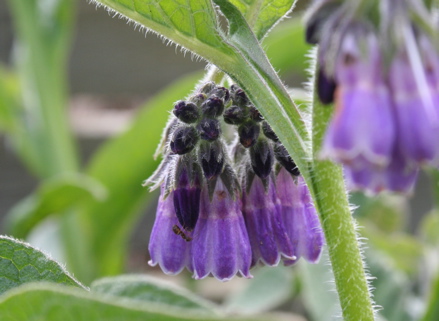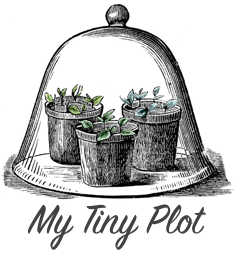To Round-Up or not to Round-Up

I had a question from Barry over at Mr Toad’s He asked: “Perhaps I can ask for your opinion on a matter: the field secretary recommended using “Roundup†to knock everything down before I start and assures me that it’s commonly used for such purposes. What’s your opinion of this chemical (the plot is pretty bad).”
Personally, I try to avoid using chemicals. However, I have to admit to using RoundUp when I first took over my plot and the occasional (very occasional) sprinkle of slug pellets. I would say that mtp is mostly organic and that our heart is in the right place. When I first got my mitts on mtp, way back in Feb 2005, it was in a pretty bad state. Ouch! But I (and the undergardener) got out our digging forks and cleared the weeds on one half of the plot by hand until it looked so much better. This process took us 10 weeks. But that was only half of the plot – the other half still looked like a weed graveyard. And because it was just turning May it was starting to grow! So I decided to use RoundUp. I asked one of my neighbours to do it, who had a handy backpack type thing which made it easy over large areas. I paid him £10. I did it, it was me!
I’m not proud of it but it did mean that I could start to use the ground straight away. I think it was a good thing that we put in 10 weeks of back-breaking work before we reached for the RoundUp – it kinda made me appreciate the instantaneously clear plot. But… and this is a big but… RoundUp will kill the good nasties as well as the bad nasties so you might want to keep that in mind if you choose to skip the digging and go straight for the RoundUp.
Please add your thoughts on whether to RoundUp or no?
 My Tiny Plot
My Tiny Plot



Well you’re not alone in pondering the morals of using a systemic weedkiller. “The Great Glysophate Debate” runs & runs among all gardners it seems.
It depends I guess, on your feelings about the importance of being totally organic for organics’s sake. If you want that badge, then you have to accept the extra labour. No option.
Personally, I don’t see organic growing as a slavish dictat, but rather as something to be aspired to when practically possible. God won’t smite down you for using the occasional artificial aid…. Only the Soil Association will do that, and I doubt their aim is as good.
I use harsh weedkillers or other chemicals sparingly, soley on occasions when I know that I’m not realistically going to be able to keep on top of the problem in the time at my disposal, in order to maintain a sustainable growing regime, that is probably of more ecological benefit in the long run.
In taking over a new site, I think there is probably something to be said for a one off blitz, if it helps you quickly get to a point where you don’t need chemicals again in the future.
The only thing I would say is that stubborn weeds like docks, thistles, and bindweed often need more than one application to kill the roots. As such weedkillers are more effective when the plants have put on a growing spurt, and will more readily draw it down, you might think about taking physical measures like hacking, digging and burning now, over the dormant period; and then use a spray more selectively later on, on those diehard offenders that re-emerge… Just to finish them off.
You spray as many gallons of the stuff around as your conscience will allow, but at the end of the day it’s never as effective in the long term as digging the blighters out.
My first thoughts were to use roundup when i took on my lottie in Aug.After a little walk around talking to other plot holders and admiring their work i decided to dig mine over by hand – some also used a rotivater. The ones that dug by hand are so much better – bloody hard work but well worth the effort in the long run……
Greenmantle – well said. I actually do spend a lot of time digging bindweed roots out of the side of the plot that was blitzed – I never seem to have to do that on the side that I painstakingly dug over.
Wendy – I used a rotivator on my other smaller plot. This was pretty effective but I think only worked because there was little or no bindweed there. I know some people who used a rotivator on their bindweed-covered plots and ended up making the problem much much worse.
I have no problem with glyphosate used sparingly. I round-up’ed my plot when I first got it because I wanted to grow veg on all of it immediately. Hand digging would have meant a very, very slow start indeed. I have only used it once since, however, and only for a very particular purpose (destroying some of the marestail!).
I don’t slavishly stick to organic principles. I try to… until it becomes silly or impossible. If you’ve put a lot of time and effort into a crop that’s being destroyed by a particular beasty or illness, it seems silly to let it go to waste for want of a bit of derris. Having said that, I only use the least synthetic and unpleasant chemicals (derris, pyrethrum and bordeaux mixture), and then only very rarely. You should hardly ever need anything if you put the effort into keeping your soil fertile and your plants well watered and happy. It’s only plants under stress that suffer significantly from pests and/or diseases IMO.
Hi
What a can of worms eh!
Roundup is probably the safest chemical that a gardener can use. It has to be in this environment aware world we now live in but it does beg the question.
Can an organic gardener cross the line if it suits them?
I am not going to start spouting politics but I remember the Blair affair concerning sending his kids to school and going against party politics to do the opposite.
I am not against the use of chemicals but what I am against is the mis-use of chemicals and I believe that all gardeners should take a competence test just like a pro has to.
What I witnessed over the years is ‘scorched earth’ policy by many ignorant people to kill off weeds.
My view is yes use Rounup but use it properly.
Strangely enough I have just covered bird habitats and the loss of native birds species on my site http://www.landscapejuice.com and it seems that too much clearance of overgrown areas or just simply paving over the lawn is damaging our wildlife.
All the best
Juicer
Another thing to consider is that you can be as organic as you like, but if the previous tennants of your plot were chemical crazy – as was usually the case when they first became widely availiable, this will this have an impact on the overall organic-ness of your efforts, some studies suggest that the chemicals can remain in the soils structure for decades, so our generation may be soley organic but the actions of our predecssors could thwart our best intentions !
Wow – no way! I didn’t realise that. Some of the (shall we say) older types down on my allotment are very free with the old chemicals and I wouldn’t be surprised if my plot has been blitzed to smithereens in the not-too-distant past.
The attitude I take is that I’m not a business who needs to be organic accredited. So what’s strictly “organic” or not is not relevant. Some people keep an “organic” compost heap and don’t pup shredded paper or fallen leaves or hothouse flowers on it because they’re not organic. I admire their dedication and attention to detail. but personally I’d rather compost those things than put them in a landfill. Choose for yourself what makes sense, what feels right. If your plot is huge and badly weedy and you have noone to help you dig it all by hand, then the choices are “roundup” or “give up”. (actually there are other choices, like cover it all with carpets and leave it for a year, but I’d forgive anyone who went the roundup route).
Good advice – Mel. It’s always better to do what you can rather than give up completely.
I must say, as a business owner in the UK back in the early nineties I found it both an irritation and expensive at the time but I am pleased that the government brought in legislation to change the way the UK used pesticides.
I live in France ttp://www.perigordvacance.com now and there is very much an igorance towards the safe use of chemicals. The older generation here seem hell bent on sprays and you wont find many people wearing safety equipment or using safety storage.
So the UK are heading in the right direction as far as change is concerned. It does worry me though that some ‘organic’ gardeners are just seeking the ‘badge’ as a status symbol rather than any ethical green code policy.
http://www.landscapejuice.com
I might point out that Round-up is meant for vegetation such as grass and weeds. It will not work on more problomatic invasive woody plants like Himalayan blackberry and scotch broom, both which are quite nasty here in the PNW. You might also consider laying a heavy mulch down after you have planted to help smother weed seeds that will pop up again in the near future.
I have to drop in to this debate, as it’s a real head-scratcher. One one side, how do we know (short of a lifetime of waiting) what pesticides really do to us (and could we link them to disease later even then?). But that lifetime is really too short to keep on trying to get shot of certain weeds. Sorry if this is a bit long!
I weed these days by sitting down on a kneeler pad on a long board and shuffling about on my bum over the bed, digging out weeds with a hand fork. I never put weeds back into the compost – the council’s hotter composter can do that! This method stops seeds going back into the soil, I’m spreading my weight so the soil doesn’t get too compacted and since I’m so close to the ground, I can usually spot the weeds and get 95% of them out. But some things are beyond the pale. I’ve got a nettle patch at the edge of the plot and bird-set little brambles all over the place. And hedge bindweed (the white one) all through the rhubarb and cultivated blackberry. Occasionally docks appear, too. So at that point it becomes a tactical game – I use a plastic bottle with the end cut off, put it over the culprit, and spray glyphosate in the cap end. That way it remains localised to the plant, doesn’t waft onto anything else, and minimises how much ground is contaminated too. Just because it neutralises on soil contact doesn’t mean it doesn’t turn into something else that’s not good for you. I also have a pot of tumbleweed gel, which I paint onto bindweed leaves.
When I cleared the plot in the first place, I used two methods – one, straight digging and then fishing the weeds out, the other, doing the hand fork thing, followed by digging over the clear ground. I think I preferred the second method as you don’t have to keep bending!
moonbells
Wow thanks for your wisdom Moonbells. I really like the idea of using a plastic bottle to localise any weedkiller. It seems to be a great compromise.